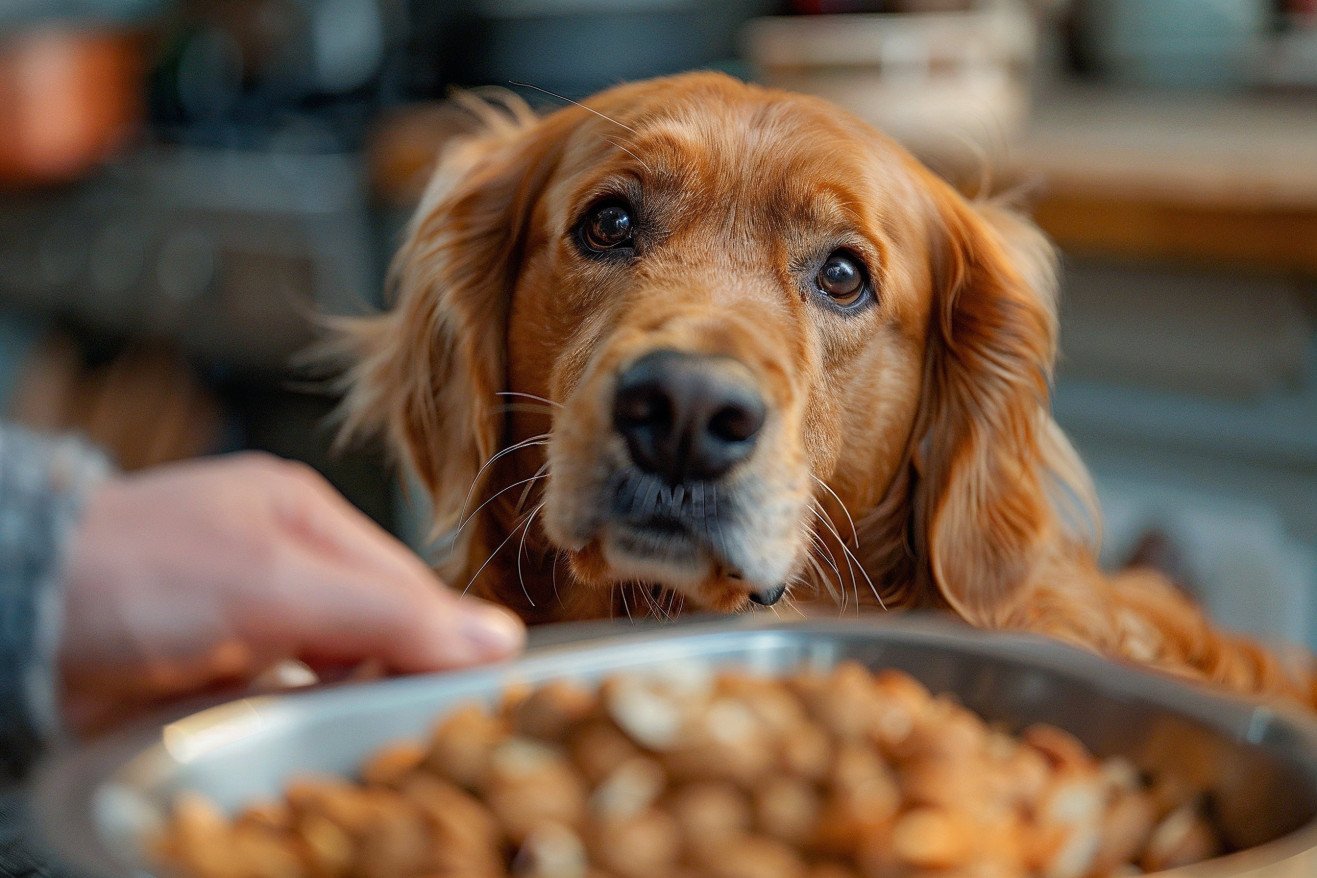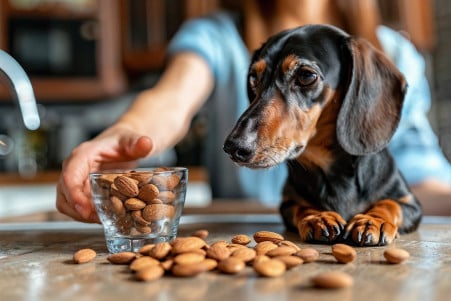Can Dogs Eat Pecans? Hazards of Canine Consumption
5 March 2024 • Updated 4 March 2024

While pecans are a delicious snack for humans, they can be dangerous for dogs. The juglone, mold, and aflatoxin found in pecans can be toxic to dogs and lead to seizures, gastrointestinal problems, and choking. If a dog eats pecans, they should be taken to a vet immediately. It’s probably best to avoid giving dogs pecans altogether.
This article will review research from veterinary medicine, toxicology, and canine nutrition to provide a complete understanding of the hazards of pecans for dogs. This in-depth analysis will reference original research papers, reputable publications, and trusted veterinary sources to break down the specific health hazards and biological responses that occur in dogs when they’re exposed to pecans and other similar toxins.
Can dogs eat pecans?
Revealing the Dangers: The Three Toxic Components of Pecans for Dogs
While pecans may be a tasty treat for humans, they contain compounds that can be dangerous for dogs. Juglone is a compound in pecans that is listed as highly toxic to many animals, including dogs, by Petco’s Animal Care, Education, and Compliance Team.
In addition, mold on pecans, especially aspergillus mold, produces aflatoxins, which can have a significant impact on a dog’s well-being. Both juglone and aflatoxins can cause symptoms that range from vomiting and diarrhea to more severe neurological symptoms like seizures and tremors.
When dogs eat pecans, they can experience poisoning as their bodies react to juglone and aflatoxins. Bond Vet explains that even small amounts of pecans can lead to liver disease because of these toxins.
If your dog eats pecans by accident, it’s important to watch it closely for signs of distress. PetMD notes that even if your dog doesn’t show symptoms right away, it’s important to seek veterinary care immediately because the sooner your dog gets treatment, the better its chances of recovery.
Knowing exactly what makes pecans toxic to dogs makes it clear that it’s important to make sure your dog can’t get to them. If you think your dog has eaten pecans, acting quickly and seeking care from a professional who knows how to treat the situation can help reduce the danger your dog is in.
Hazards and How to Manage Them: Nut Toxicity in Dog Diets
Nut toxicity in dogs is not limited to pecans and includes a range of other nuts that can pose a threat to our four-legged companions. For example, macadamia nuts are well-known for being toxic to dogs and can cause symptoms like muscle weakness and vomiting, according to PetMD.
In addition, black walnuts contain juglone, the same toxic substance found in pecans, and can result in seizures and neurological problems in dogs. Moldy walnuts are particularly dangerous because they can contain mycotoxins, according to Preventive Vet.
While some nuts, such as peanuts and roasted cashews, are safe for dogs in moderation, they should be unsalted, uncoated, and fed in small amounts because they are high in fat and calories, according to Pumpkin. Eating nuts can lead to obesity, pancreatitis, choking, and gastrointestinal obstruction, with symptoms that include vomiting, diarrhea, and lethargy.
Make sure that any nuts you give to dogs are free of xylitol and other toxic ingredients. It’s important to be aware of the signs of nut toxicity and to seek veterinary care if you notice any negative symptoms. Part of being a good pet parent is understanding which treats are safe for our dogs and how to safely incorporate them into their diet, always with the goal of keeping them healthy and happy.
How Juglone Toxicity Affects Dogs
Juglone is a natural compound that is found in all parts of the pecan tree, from the leaves to the nuts. It has antibacterial and antifungal properties but is also toxic to mammals, including dogs. A study on black walnut toxicity in dogs, which also contains juglone, found that dogs that ingested the plant experienced gastrointestinal upset and neurological disturbances.
The impact of juglone toxicity on dogs is serious. Even small amounts of juglone can cause vomiting, diarrhea, tremors, and seizures. As the American Kennel Club notes, dogs that eat pecans can experience severe vomiting and potential pancreatitis due to the high-fat content and toxic compounds.
Juglone toxicity is diagnosed based on clinical signs and a history of juglone exposure. Treatment is based on the symptoms and can include inducing vomiting, giving activated charcoal, and providing supportive care for dehydration and liver support.
Toxicity can be prevented by keeping dogs away from pecans and areas where the nuts or trees grow. A study published by PMC on the cytotoxic and mutagenic potential of juglone shows that there is a need for more awareness of the dangers of this compound. Knowing how juglone affects dogs is important for preventing and treating toxicity and keeping our pets safe from this toxic substance.
Protecting Your Dog’s Liver from Toxins
The liver plays a key role in metabolizing and detoxifying the substances that dogs consume, including the toxic compounds in pecans. The liver metabolizes toxins and helps the body excrete them so that they don’t build up and cause harm, according to a PMC article.
When a dog eats something toxic, the liver works to break down the toxic substances and convert them into less toxic forms. If the liver is overwhelmed, however, it can be damaged and even develop cirrhosis, according to a study on the clinico-hemato-biochemical profile of dogs with liver cirrhosis published in a scientific journal.
To protect the liver and reduce the risk of toxicity, IVC Journal suggests dietary changes and supplements. For example, a diet that’s low in saturated fats and high in amino acids like methionine and cysteine can help maintain liver health. A study published in a PMC article found that antioxidants like silymarin, which is derived from milk thistle, have hepatoprotective effects and improve liver enzymes and antioxidant status in dogs.
By keeping the liver healthy, dogs can better tolerate the occasional accidental exposure to toxins. A healthy diet and the right supplements can help protect a dog’s liver, which in turn can help ensure a dog’s overall health and longevity.
Healthy and Safe Snack Options for Your Dog
Although pecans are not safe for dogs to eat due to their toxic properties, there are many healthy and safe snacks that you can give to your dog. Rogue Pet Science offers a line of dog food toppers and supplements that are formulated to meet the nutritional needs of dogs, and they are fortified with Omega-3 fatty acids and essential vitamins to help support a dog’s immune system without the potential risks of nuts.
Instead of nuts, opt for dog-safe fruits and vegetables like carrots, blueberries, and apples (just make sure to remove the seeds), which are full of vitamins and fiber. For example, carrots are low-calorie snacks that are packed with beta-carotene, which is good for a dog’s eyes. Always start with small amounts of new snacks to make sure your dog can tolerate them and to avoid stomach upset.
When giving treats, make sure to avoid human foods that are poisonous to dogs, watch out for harmful ingredients like xylitol, and make sure that treats make up no more than 10% of your dog’s daily calories to ensure that they are getting a well-rounded diet. With the right snacks and a few simple rules, you can spoil your dog with treats that are safe and good for them.
Final Thoughts: Protecting Dogs from Pecan Toxins
As discussed in this article, pecans are a danger to dogs because of the juglone, mold, and aflatoxins they contain. These toxins can lead to a variety of symptoms, from mild stomach upset to severe neurological problems and liver failure. It is important for pet parents to protect their dogs by keeping pecans away from them and seeking help if they accidentally eat them.
The larger issue of nut toxicity in dogs shows the importance of understanding the complexities of dog nutrition and how awareness can help prevent problems. By learning about the foods that can hurt our dogs, we can make choices that support their health.
That said, this information underscores the importance of watchful care in protecting dogs from toxic substances. Informed pet parents are empowered to be the best guardians they can be and ensure their dogs live long, healthy lives. It’s also important to work with a veterinarian if you have any questions about what to feed your dog to ensure their health and safety.


